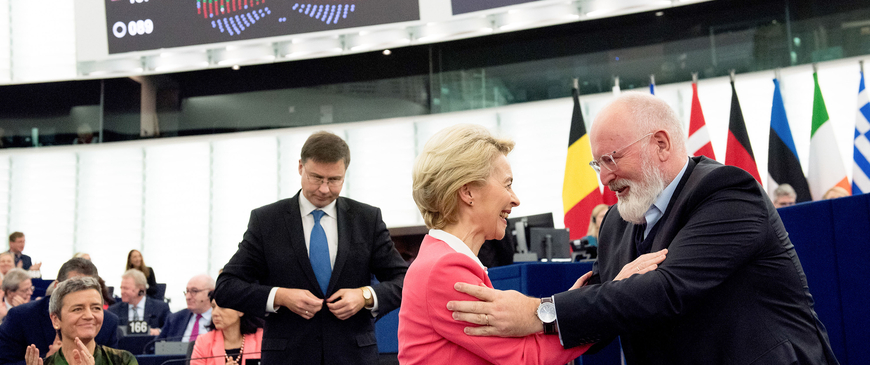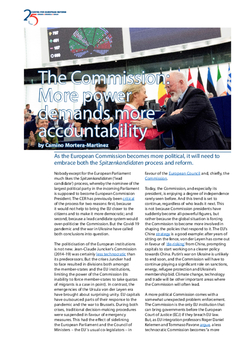
The Commission: More power demands more accountability
As the European Commission becomes more political, it will need to embrace both the Spitzenkandidaten process and reform.
Nobody except for the European Parliament much likes the Spitzenkandidaten (‘lead candidate’) process, whereby the nominee of the largest political party in the incoming Parliament is supposed to become European Commission President. The CER has previously been critical of the process for two reasons: first, because it would not help to bring the EU closer to the citizens and to make it more democratic; and second, because a lead candidate system would over-politicise the Commission. But the Covid-19 pandemic and the war in Ukraine have called both conclusions into question.
The politicisation of the European institutions is not new. Jean-Claude Juncker’s Commission (2014-19) was certainly less technocratic than its predecessors. But the crises Juncker had to face resulted in divisions both amongst the member-states and the EU institutions, limiting the power of the Commission (its inability to force member-states to take quotas of migrants is a case in point). In contrast, the emergencies of the Ursula von der Leyen era have brought about surprising unity. EU capitals have outsourced parts of their response to the pandemic and the war to Brussels. During both crises, traditional decision-making procedures were suspended in favour of emergency measures. This had the effect of sidelining the European Parliament and the Council of Ministers – the EU´s usual co-legislators – in favour of the European Council and, chiefly, the Commission.
Today, the Commission, and especially its president, is enjoying a degree of independence rarely seen before. And this trend is set to continue, regardless of who leads it next. This is not because Commission presidents have suddenly become all-powerful figures, but rather because the global situation is forcing the Commission to become more involved in shaping the policies that respond to it. The EU’s China strategy is a good example: after years of sitting on the fence, von der Leyen has come out in favour of ‘de-risking’ from China, prompting capitals to start working on a clearer policy towards China. Putin’s war on Ukraine is unlikely to end soon, and the Commission will have to continue playing a significant role on sanctions, energy, refugee protection and Ukraine’s membership bid. Climate change, technology and trade will be other important areas where the Commission will often lead.
A more political Commission comes with a somewhat unexpected problem: enforcement. The Commission is the only EU institution that can bring governments before the European Court of Justice (ECJ) if they breach EU law. But, as EU integration professors Roger Daniel Kelemen and Tommaso Pavone argue, a less technocratic Commission becomes “a more legitimate law-maker (…), but at the cost of (being) a less credible law enforcer”. The von der Leyen Commission has struggled to enforce rule of law provisions in the treaties, while keeping offending governments in the fold. The problem has been particularly acute since Russia’s invasion of Ukraine. The next Commission will face similar challenges. If a version of the Commission’s proposal to reform the Stability and Growth Pact ends up being adopted, senior officials worry that a member-state’s ability to comply with fiscal rules will very much depend on how skilled it is in negotiating with the European Commission.
As the Commission becomes increasingly more political and embedded in EU citizens’ day-to-day lives, it will face two separate but related challenges: first, how to make sure that Europeans get some say in who leads the Commission; and second, how to ensure that it continues to be able to enforce EU law, even as its political role grows.
As it stands, the Spitzenkandidaten process will not help with the first of those problems. Only half of those who can vote in the European Parliament elections actually do so. And the elections are still too focused on national matters. But there are a few changes that could help. The first would be for all European political parties to present one candidate who would campaign on clear-cut EU topics. In the past, only the largest groups in the Parliament have put forward a lead candidate. Both the Liberals and the Greens had reasons to be wary of a process that has traditionally mainly benefited the European People’s Party and the Party of European Socialists. But this does not have to be the case any longer: the 2019 elections yielded the most fragmented European Parliament in history. And liberal prime ministers are in power in countries like Belgium, France and the Netherlands, while the Greens are in coalition in Germany. In many member-states, two-party systems have given way to complex coalition building, which incentivises smaller parties to run for elections in the hope of becoming king-makers. Current polling projections confirm this trend for the forthcoming European elections, too.
Second, European political parties should make the EU’s shift from a technocratic to a political organisation work in their favour. Over the past three years, the Union has done previously unthinkable things, like procuring vaccines and funding weapons for Ukraine. It has also tried to shield EU citizens from economic hardship, by raising common debt, injecting money into the economy and jointly procuring gas. Von der Leyen is better known in the member-states (and the world) than most of her predecessors. She has also expressed clear views on matters that European citizens care about, like energy, climate change and the international situation. If she runs, other parties would have a chance to put forward candidates who could challenge some of her ideas, and even her handling of the pandemic and the war. Imagine a frugal candidate opposing joint debt, a farmer-friendly candidate arguing for less ambitious climate and energy policies, a dovish candidate favouring dialogue with Russia and China or a populist candidate outright opposed to supporting Ukraine. This would make for a Spitzenkandidaten process that looks more like a national political contest than a debate around ideas that few people outside the Brussels bubble care about.
Tensions between politics and enforcement within the European Commission will be more difficult to solve. Enforcement decisions cannot be made in a void. But the risk is that, in acquiring new political powers, the Commission will abandon its enforcement role altogether. Unlike in member-states, there is no other EU institution or body to which the Commission could outsource such powers (with the very limited exception of the European Public Prosecutor’s Office, EPPO, the remit of which only covers crimes against EU financial interests). How can an increasingly politicised European Commission function both as an enforcer and a political master? One idea could be to create a new independent prosecutorial body or to expand the powers of the EPPO, but that would require lengthy negotiations and is unlikely to win the support of all member-states (Denmark, Ireland, Hungary, Poland and Sweden are not members of the EPPO). An easier way would be for the next Commission to reorganise its departments in a way that reflects the new situation. It could, for example, divide its directorates more clearly between those responsible for policy-making, drafting directives and so on; and those responsible for the executive functions of enforcing directives and regulations and launching infringement proceedings. Vice Presidents should also be more accountable to both the European Parliament and the European Council – by, for example joining meetings of the latter when matters under their supervision are discussed.
The pandemic and the war have made the European Union more powerful. EU governance should reform accordingly.
Camino Mortera-Martinez is head of the Brussels office at the Centre for European Reform.

